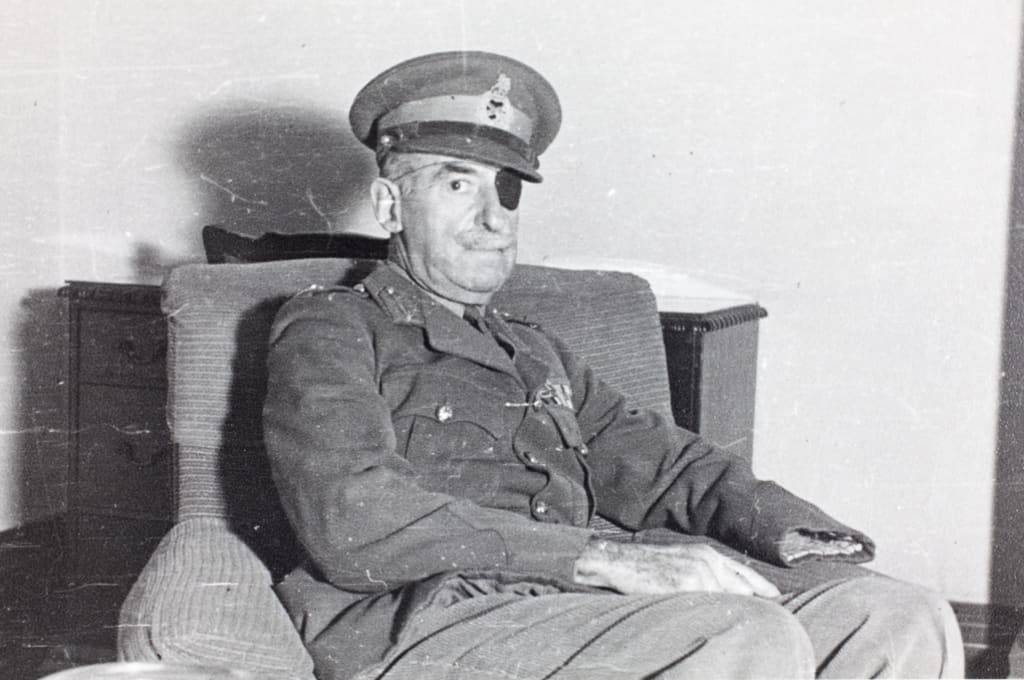In the annals of military history, few figures stand out as vividly as Sir Adrian Carton de Wiart. Born in 1880 in Brussels, Belgium, de Wiart's life reads like an action-packed novel, filled with daring escapades, brushes with death, and an unwavering spirit that carried him through some of the most tumultuous events of the 20th century.
From his early days, de Wiart seemed destined for an extraordinary life. Rumours swirled that he might have been the illegitimate son of King Leopold II of Belgium, hinting at the influential circles his family moved in. However, it was not his potential royal lineage that would define him, but rather his insatiable appetite for adventure and his almost superhuman resilience.
De Wiart's military career began with the Second Boer War in 1899. Despite not being British, he managed to enlist by using a false identity. This marked the beginning of a military journey that would span over four decades and see him participate in three major conflicts: the Boer War, World War I, and World War II.
Throughout his service, de Wiart displayed an almost reckless bravery that earned him both admiration and a litany of severe injuries. He was shot in the face, head, stomach, ankle, leg, hip, and ear. He survived two plane crashes, tunnelled out of a prisoner-of-war camp, and lost his left eye and left hand. Perhaps most remarkably, he is said to have bit off his own fingers when a doctor refused to amputate them after a particularly severe injury.
Despite these setbacks, de Wiart's enthusiasm for combat never waned. He famously described his experience in World War I by saying, "Frankly, I enjoyed the war." This statement, while shocking to many, perfectly encapsulates de Wiart's unique perspective on life and conflict.
Between the world wars, de Wiart's life was no less eventful. He served as the head of the British Military Mission to Poland, where he rubbed shoulders with future world leaders and even found himself involved in a duel. He later settled in Poland, living the life of a Polish nobleman, hunting and fishing in the vast Pripet Marshes.
World War II saw de Wiart back in action, despite being in his sixties. He participated in the Norwegian Campaign and was later sent on a mission to Yugoslavia. It was during this mission that he survived yet another plane crash, this time off the coast of Italian-controlled Libya. After swimming to shore, he was captured and sent to a special prison for high-ranking Allied officers in Italy.
Even as a prisoner, de Wiart's indomitable spirit shone through. He made numerous escape attempts, including a particularly audacious plan involving digging a tunnel from a disused chapel. Although he was eventually recaptured, his persistence and ingenuity were remarkable, especially considering his age and physical limitations.
In a twist of fate, de Wiart's capture ultimately led to a crucial role in the war effort. The Italians, looking to negotiate their surrender to the Allies, chose de Wiart as an intermediary. Although he didn't end up brokering the final deal, this episode highlights the respect he commanded even among his enemies.
After the war, de Wiart continued to lead an active life, serving as Winston Churchill's personal representative to China. His diplomatic missions didn't dampen his adventurous spirit; he still managed to crash another plane while on a "whiskey run" to Ceylon (now Sri Lanka).
De Wiart's personal life was as colourful as his military career. He was married twice, both times to women with impressively long names. Interestingly, in his autobiography, he barely mentioned either of his wives, perhaps indicating that his true love was always the thrill of combat and adventure.
Throughout his life, de Wiart accumulated an impressive array of medals and honours, including the Victoria Cross, Britain's highest military decoration for valour. Yet, despite his aristocratic background and numerous accolades, he died with little money to his name in 1963, at the age of 83.
Sir Adrian Carton de Wiart's life story is a testament to human resilience and the indomitable spirit of adventure. He lived through some of the most significant events of the 20th century, not as a bystander, but as an active participant. His ability to bounce back from injuries and setbacks that would have ended most careers is nothing short of astounding.
What makes de Wiart's story even more remarkable is how little-known it is to the general public. Despite living a life that puts most action movie heroes to shame, he remains a relatively obscure figure outside of military history circles.
Perhaps what we can learn from de Wiart's life is the power of perseverance and the importance of embracing life's challenges head-on. While few would wish to endure the physical hardships he faced, his unwavering determination and zest for life are qualities we can all aspire to.
In an era where the term "legendary" is often overused, Sir Adrian Carton de Wiart truly deserves the title. He was a man who not only survived the turbulent first half of the 20th century but thrived in it, leaving behind a legacy of courage, resilience, and an unquenchable thirst for adventure.
As we reflect on de Wiart's extraordinary life, we're reminded that sometimes truth is indeed stranger than fiction. His story serves as an inspiration and a reminder of the incredible capacity of the human spirit to endure, adapt, and overcome seemingly insurmountable odds. Sir Adrian Carton de Wiart may well have been, as the title suggests, the most interesting man in the world.



